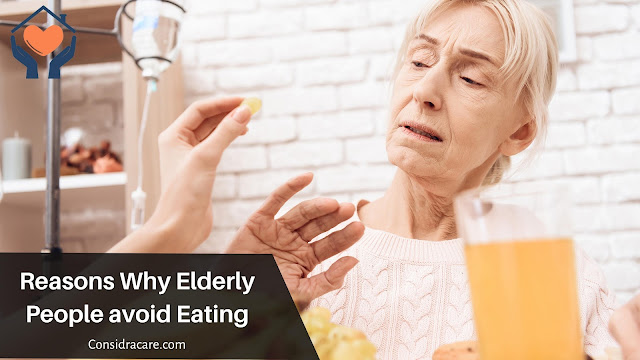Reasons Why Elderly People avoid Eating
Many
physiological and lifestyle changes accompany ageing, which might result in a
decrease of appetite in the elderly. However, occasionally the culprit is a
significant issue that requires treatment. The first step is to visit your
loved one's doctor if you detect changes in their eating patterns, unexplained
weight loss or gain, or general lethargy.
5 reasons elders eat less
as they get older
There
are various reasons why the Elderly refuse to Eating as they used to. The
following are examples of typical reasons:
·
Seniors require
fewer calories due to a lower metabolic rate and less physical activity.
·
Food might become
less appetizing as one's sense of smell and taste changes. We lose taste buds
as we age.
·
Dental issues and
gastrointestinal changes, such as lactose intolerance, can accompany ageing and
make eating difficult.
·
Inability to make
meals, especially for the elderly who live alone and have trouble cooking or utilizing
kitchen utensils and appliances.
·
A lack of or
variation in a regular routine might create discomfort or disorientation at
mealtimes.
Problems that contribute
to a geriatric appetite loss
A
lack of interest in food is not always the result of age. Common health issues
that can reduce hunger:
·
Loneliness or
depression
·
Symptoms of
dementia
·
Medication-related
side effects
·
Insomnia or other
sleep issues can result in less energy to prepare.
Less
common but important underlying reasons of lack of appetite in the elderly
include:
·
Parkinson's disease
(PD)
·
Cancers of the
head and neck
·
Infections of the
mouth and throat
·
Periodontal (gum)
disease
·
Dysfunction of the
salivary glands
·
Thyroid problems
Other reasons can
include:
1. Water deficiency
When
seniors do not drink enough water, their appetite suffers, leaving them weak
and dizzy. In addition, they may experience decreased urine output,
constipation, and headaches. If you find your elderly relative exhibiting these
symptoms, encourage him or her to drink eight glasses of water every day. Make
sure your loved one always has a glass or bottle of water around to promote
hydration. Making water readily available is an excellent method to reduce the
risk of dehydration.
Consider
hiring a professional caregiver if your loved one needs encouragement to drink
enough water or to focus on other healthy lifestyle considerations. Seniors
might benefit greatly from home care service agencies. Your elderly loved one
can have a happier and healthier life with the assistance of home care
providers.
2. Reduced Taste
Some
seniors note that their capacity to discern flavours declines as they get
older. If your loved one's favourite dishes become bland and uninteresting,
experiment with adding exciting new flavours to his or her meals. Consider
incorporating spices from other civilizations. Your loved one may develop a
taste for Indian or Thai cuisine.
3. Difficulties Chewing
Difficulties
with the eating process might also cause a loss of appetite. Your loved one is
less likely to enjoy meals if he or she has difficulty chewing, swallowing, or
using utensils. Caregivers can prepare nutrient-rich drinks or smoothies for
breakfast for elders who have difficulty eating and swallowing. If your loved
one has difficulties using utensils, provide finger food. Chicken strips and
carrot sticks are excellent choices for seniors who struggle with motor
coordination.
Living
with chronic health issues might make it difficult for elders to age in place.
They can, however, retain a greater quality of life with the assistance of
Expert Live-in Care. Meal preparation, bathing, transportation to the doctor's
office, prescription reminders, and other services are available to seniors in
Toronto.
4. Sensitivity
Seniors
can acquire sensitivities to certain scents, tastes, and foods. Keep a record
of your loved one's culinary preferences. If your loved one develops
intolerance to a particular smell or suffers from stomachaches after eating a
particular meal, his or her diet should be modified. Some of these
sensitivities may indicate a health problem that should be discussed with a
doctor. If your loved one gets stomach bloating after eating bread, it could be
an indication of a gluten allergy. However, if your loved one has just
developed a dislike for a particular flavour, make an effort to accommodate him
or her. Seniors are more inclined to consume meals if they enjoy them.
5. Improper Routine
Caregivers
should strive to create daily meal routines. When seniors eat at different
times throughout the day, their bodies receive confusing signals, which can
lead to a lack of appetite. You might persuade your loved one into eating
nutritious meals by adopting consistent mealtimes. Caregivers should focus on
serving small servings of nutrient-dense foods to elders who are still
reluctant to eat. Nut butters, avocados, berries, and broccoli are all good
options.
.jpg)


Comments
Post a Comment